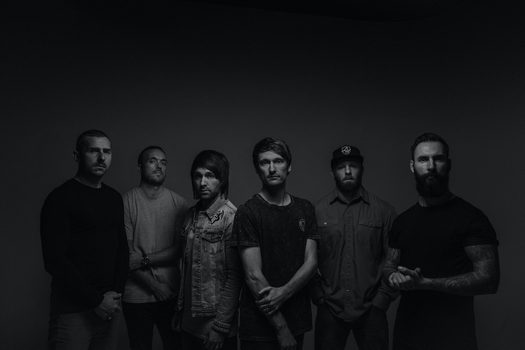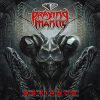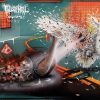Devil Sold His Soul – Emotion and Loss
Thursday, 22nd April 2021
Metalcore act Devil Sold His Soul has recently put out their latest full-length, and first in almost ten years, with Loss. An album that sees the return of original vocalist Ed Gibbs as he sings along with vocalist Paul Green, as well as the first release for the band under new label Nuclear Blast Records. So there was much to discuss when we sat down for a talk over Skype with both vocalists. You can check out their thoughts on the new material, utilizing both of their vocals on the record, the pros and cons of a more unique sound, and more.
Dead Rhetoric: Since your last full-length, I know you’ve put out some shorter releases and done some touring, but what has the band been up in the last 10 years?
Paul Green: We went through a patch where we went through a lot of touring but we weren’t really thinking about writing too much. Even with the EP between the last album and now, we were just doing a few songs here and there. Once we got the point where we brought Ed [Gibbs] back into the band and we did the anniversary tour, that was really the first time an album had been thought about. We have kind of been languishing around. We haven’t really had that positive vibe and mental direction to sit down and want to be creative.
Ed Gibbs: I would say that everyone in the band has kind of been sorting out their careers and personal lives in this gap. In that period in between writing the last EP and now, everyone has really been focused on getting their lives and work off the ground, so that we can really enjoy this properly.
Green: It’s been important, and a big realization for many people. Striking a balance in our lives – we aren’t Metallica or anything. We want to be sustainable in our own lives as well as everything else. It’s an amazing thing to do on the side. But first and foremost, you have to pay the bills. That lets you enjoy it more.
Gibbs: I think you can enjoy it more when you put yourself in a position where you are more comfortable for the future. Otherwise you are putting too many eggs into one basket.
Dead Rhetoric: How do you feel that Loss compares to your last releases?
Green: I’d say we approached it quite fresh. We didn’t look back to much. In terms of comparing it, that’s probably going to be more subjective to the fanbase. Everyone has a favorite album from the past, and that might not be about what is the best musically, but where you were at the time you heard it. For us, this is a very personal record because of what went on in the last few years.
Gibbs: I feel like some weird things happened, but we attacked it the way we have always attacked a record. It’s a case of writing the best songs we can at the time. It does feel like there are some interesting throwbacks to the records we have put out over the last sixteen years. There are some elements where people have said it reminds them of some previous material. It’s really nice, because it wasn’t planned, but it means that it sounds like us…which is quite cool.
Green: Yeah, even after nine years [laughs].
Dead Rhetoric: This is the first album with the two of you both doing vocals. How did you plan out who would sing where? Are there things you are able to do now with both of you doing vocals that maybe you could not have done with just one person?
Green: The overlapping harmonies are the biggest thing really. I think we have made things a bit more interesting vocally. We have done harmonization with ourselves on past records, but this adds so much more to it. We also have been putting both of our writing styles together. I think it makes it more interesting in some ways.
Gibbs: We have definitely written stuff between us that neither of us would have come up with alone. It’s been properly collaborative. It hasn’t been a case of one person says that someone is doing this or someone is doing that bit. It’s been a case of us working together in a very natural way. We just hang out and record the first thing that comes to mind. We press record and just start singing away. We analyze the bits and look at what was good/bad about it and crafting things from natural instinct rather than trying to think about it for ages. We just go at it. It was really natural.
Green: It was quite liberating in some ways. It takes away some of the stress. If you go into something very pre-meditated and you put down and idea that you have been mulling over for so long and if it doesn’t work, you are going to destroy yourself with self-doubt.
Gibbs: Having that other person there with you allows you to…if you do something and think it’s wrong, having someone else there to look at it, even if it’s only two notes you can pull stuff out where you might otherwise have just discarded it straight away if you were being a bit brutal on yourself. We really worked at pulling out different shifts between notes. A line might not have worked, but the shift may have been amazing. So we would work from there. It was a liberating way to work, and boosted our confidence having someone more kind there, because I think we are more brutal on ourselves [laughter].
With two vocalists, it initially almost serves no purpose other than to appease ourselves. We did the shows and we had a really fun time so we said, ‘hey, let’s keep doing this.’ We could have done this album as a single vocal thing, but I think it’s all the better for it. Like Paul was saying earlier, when we do harmonies together, we collaborate and our voices are quite different. You get quite a different vibe than when you do your harmonies alone. It becomes wider because the vocals stand out from each other. The parts we came up with, it’s not out of one mind but both of ours. There’s bits that Paul is singing that I’ve written and vice versa. It’s weird because on paper, there should have been discussions about who is singing when, but we didn’t have many concessions about who is singing where.
Green: It’s been amazingly easier. There wouldn’t have been friction anyway, but it made the discussions easier.
Gibbs: It’s been the least stressful and easiest time I’ve had writing vocals on an album I think. Although early on the anxiety was building because we did try to write at home. We tried to do it separately but it wasn’t really getting off the ground. I think it just didn’t work for us as a band. We need to be in a room together and really thrashing ideas out. As soon as we as a band decided to focus more time into the rehearsal space, the songs came about a lot quicker. The second Paul and I started working in the same room on vocals, it was like, “Oh wow, this goes together quite well!” So it took us a little while to get there.
Dead Rhetoric: I think it adds a fresh dynamic to have two different voices. Even if, as you said, you could do it with one person, it does give it a different appeal overall.
Gibbs: I think the thing that is kind of weird about it is that a lot of bands, when they use two vocalists, it comes across as a bit of a gimmick. I don’t see any gimmick here. It doesn’t feel that way.
Green: It definitely doesn’t feel that way. If people feel that way, it’s their decision but it’s what we wanted to do. It wasn’t like, “Hey, let’s play into the hands of the fans by bringing Ed back in” and doing that. It was just about us enjoying it. For us, enjoying this is the most important thing now.
Gibbs: That’s just it. If we had done the anniversary shows and it was like, just okay, in terms of band dynamic, we wouldn’t have gone anywhere with me in the band. I would have gone back to the way it was before. I think it’s just because everyone really liked each other’s company and wanted to continue playing together.
Dead Rhetoric: Could you also go into some of the personal connections to the lyrics on the album as a whole for the band?
Green: It’s quite a mixed record, and it does go into a lot of different types of loss. I guess the ones that mean the most to me are “Witness Marks,” which is about mental health and struggles with anxiety. I have had some massive issues in the last few years. The final track, which is the title track, is about our drummer’s mom passing away. At one point, we were interviewing Leks [Wood] and just finding out where he was at and we wanted to do a track in memory of his mom. We wrote down everything he was saying and turned that into the lyrics. So those two are really personal because they really impacted me when I was writing them.
Gibbs: I was just thinking about that. Leks’ mom passing really brought him to his knees. It framed the whole album for us at the start. I wouldn’t in any way say that Leks has recovered from it, but the whole process of the record was during his recovery process. We all knew his mom, and it framed everything. The album couldn’t have been about anything else I don’t think.
Green: It made sense. If you aren’t singing about something that means something to you, why are you bothering? If you aren’t singing something that gives you some catharsis, or are cathartic about, what’s the point? For us, we are very emotionally involved with each song. We aren’t just writing to please people. It has to be something that means something to us. I don’t think there is anything that could mean more to us, than losing someone that you care about.
Gibbs: We were talking yesterday about how songs evolve through the days and months after you have written them. Certainly in this past year, there has been a lot of loss that has happened – whether it be human loss or loss of liberties or social life. So much has been lost in this past year and its kind of interesting how that frames into the album as well.
Dead Rhetoric: The cover itself is pretty eye-catching. Does it hold any significance in the grand scheme of things?
Green: Our guitarist Rick [Chapple] did the photography for the whole thing – the cover, the inside, and everything. It’s just the bleakness of it. We were looking for an idea for a cover and that was just it. It meant something. There was cold and lonliness.
Gibbs: And beauty as well. It is beautiful.
Green: The inside has some solitude and isolation in it. We wanted to make this a really personal record. Obviously the music and lyrics are, but we’ve done the artwork ourselves too. There’s also some quotes and things that Leks put into the sleeves and everything. It means a lot. We wanted to make sure that everything is 100% what we wanted.
Gibbs: I love it. It’s also the first bit of photography we have done. Before it was all illustration and graphic design. So it’s a bit of a change, but it was the right thing to do. It was nice to me. Even though photographic covers aren’t anything new, but for us, it broke some new ground for the band.
Dead Rhetoric: Your sound doesn’t really fall neatly into one category. Do you feel that’s more of a blessing or a curse?
Green: It’s both [laughs]. I think that our fans love us because it checks every box for them. It’s been a real struggle though, in terms of trying to tour with other bands. We have really struggled to get support slots. We once did an Underoath tour, which was fucking amazing and we fit nicely. But because we aren’t metal enough for the metal bands, and we aren’t mainstream enough for the mainstream bands, we sit in this no man’s land. It works for us and against us. I think we are a bit niche.
Gibbs: It’s tough, and you can see some of the reactions by the heavier fans on Nuclear Blast – the gatekeepers. They aren’t really that keen on us being on the label, which I totally get. People will have opinions and people like what they like. I came to the conclusion the other day that a lot of these people just don’t like modern metal. Modern metal is very broad. There’s subgenres and subgenres that mix different things. And they just don’t like, which is totally fair. I just think that they dismiss things because they ‘aren’t metal,’ and yeah it’s not ‘80s metal or traditional metal but…
Green: If you went to the cd section of a shop it would still be under the metal section [laughs]. I think that’s the funny thing about metalcore. It’s been thrown around for years now and it used to be a very specific genre. Now I think metalcore just means modern metal if you think about it – it’s metal and hardcore. That’s basically everything under the umbrella.
Gibbs: I don’t mind people’s opinions about it either, but it’s just the comments sometimes. You don’t have to write something if you don’t like it. It’s fine. It’s like if you walk down the street and go into your favorite shops. You don’t go into the shops I don’t like and just shout, “You’re shit!” through the doors at them. The personal attacks that people do, it’s like, why are you doing that?
Green: So yeah, we don’t fit in easily…to get back to the original point [laughs]. We appreciate that everyone has their favorite things, and we are just happy that some people like us [laughter].
Dead Rhetoric: On the other hand, I think a band signing with Nuclear Blast would offer some legitimacy to it. I think there’s always a need for those middle ground bands, like you were saying. It might be too heavy for some but not heavy enough for others. There’s getting to be a point where this is a growing area where bands can flourish and grow.
Green: The middle ground is where the interesting stuff happens. It’s where the left-field and outside the box stuff is happening. People are trying stuff and it is interesting. People are mixing stuff up together. If you go to the staples, I get it but I’ve certainly heard it before.
Gibbs: Definitely. There’s some really great stuff on Nuclear Blast, as well as the back catalog. You have bands with operatic singing like an Epica and then you’ve got straight-up super heavy stuff like Meshuggah and Dimmu Borgir. It’s a broad church. I know we are maybe more core than those bands, but there’s a place for us. Nuclear Blast did sign us, and they know what they are doing. As a quick aside, what an amazing label! They have been so good to us. We have been on labels in the past where we have not had the same amount of support or people just believing in us. It’s been a really nice experience and they have been wonderful.
Green: Incredible. Resources-wise, especially with this campaign. We wouldn’t be speaking with you today. US press would not have happened if it had been like previous records.
Dead Rhetoric: You talked about mental health a bit earlier, but to go back to it, do you feel it’s an important thing to discuss in terms of the band?
Green: It really is. I have had on and off issues for the past 10 years. I wouldn’t say they have been really bad, but they have made my life more difficult. There are several members that do struggle.
Gibbs: I think we are all introverted a bit and lean in that direction.
Green: I guess there’s a lot of people in the creative industry that have those issues. For some reason, the creative industry is absolutely teeming with it. A lot of bands use it as a platform to talk about it. We aren’t one of those bands that are going for that direction, but it’s more about the cathartic process. There are some lines that I mulled over for quite some time, and Ed too. It meant a lot to write it all down. It gets it all out of your head. You need to get it out to free space up.
Dead Rhetoric: To wrap up, what’s planned for the rest of the year?
Green: The touring side of it is tough. It’s really saturated because of tours being pushed over from last year. We know we will have some headline shows in 2022, but we are trying to get some stuff for this year too. We are working on some extra music as well, as part of this campaign, that literally just kicked off. We have a beer coming out!
Gibbs: I honestly wouldn’t be surprised if we just started writing some more music, because what else are we going to do?
Green: It feels like a good time to do it. We have some ideas floating around, and once we have that down time it would make sense to do something.
Gibbs: It’s really weird. Previously when we put a record out, there’s this build up and build up and then you release and start to do shit. This time it will be building up and then release day…then nothing for a year. I keep saying it’s going to be like having the holiday blues. All of that build up and then it’s like, now what?
Green: We are going to see what we can do. Hopefully we can get some shows. We would like to jump on a support slot, if we can, in the autumn or winter. Just to make use of our time, as well as the buzz that’s surrounding the band at the moment.
Gibbs: We have our fingers massively crossed for some of these festivals in the UK. The problem is that they are so saturated with two years of bookings. But not all the international acts would necessarily be able to make it, so some slots may open up.
Green: It would be good to get to the US as well. We have been talking about how we use our time, and we can’t do loads of touring every year because we have jobs and etc. But that means that we can really focus on what is important to us, touring-wise. So if we set aside a bit of our time, we could do a 3-week US tour. That would be right up there on our bucket list. We have family out there so it would be nice to see them as well.
Gibbs: It’s crazy to think we have been a band for 17 years and never set foot into the US. It’s one of those things – it’s a hard nut to crack.
Devil Sold His Soul on Facebook






















